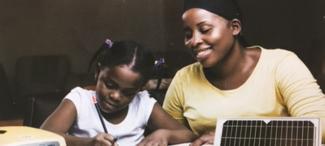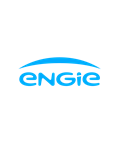Orange and ENGIE have today launched a plan to deploy nearly 1,000 solar kits in Senegal, Côte d'Ivoire and Cameroon. Several villages in rural areas have been identified to participate in the first phase of this pilot program, prior to deployment on a larger scale.
The kits include a solar panel connected to a battery that can be used to provide domestic appliances with electricity. They also contain a remote control solution and a mobile payment system, providing a decentralized source of renewable electricity to homes that are not connected to the grid. The solar kits can be used as a lighting solution with LED lamps, to operate small electrical appliances (radio, television, etc.) or to recharge mobile phones.
This equipment offers an alternative solution, at low cost, that can replace petroleum lamps, disposable batteries or diesel-powered devices, which are all potentially dangerous pollutants.
Within the framework of this partnership, ENGIE will supply the solar kits through BBOXX and Fenix International, both of which are companies that have worked with ENGIE for several years and that have become references in the supply of solar-powered equipment. ENGIE will also take responsibility for the installation and maintenance of the equipment. Orange will ensure the commercial deployment and management of billing via "Orange Money". The service will allow customers to pay rent for the use of the equipment, allowing them to pay by instalment rather than through an upfront investment. In addition, this mobile payment system offers customers a simple and secure way to pay remotely, thus avoiding the need to travel long distances with cash.
Access to energy is a major challenge for the African continent. Around 90% of the population of sub-Saharan rural Africa does not have access to the electricity grid. In this context, Orange and ENGIE signed an agreement in 2015 to collaborate on ways to develop the electrification of rural areas and to optimize the supply of electricity to telecoms infrastructure in Africa. During the COP22 conference, Orange and ENGIE reaffirm their commitment to leveraging their technological expertise to stimulate sustainable progress and economic and social development on the African continent.
ENGIE in Africa
ENGIE has been present in Africa for over 50 years, where it operates in the fields of electricity, natural gas and services. ENGIE has a cumulated energy capacity of approximately 3,000MW across power plants in operation or under construction. ENGIE is also working on decentralized electricity production for isolated companies and rural villages in order to achieve the global goal of providing 20 million people with electricity by 2020. The Group is also researching opportunities for the deployment of home solar systems and mini-grids, as well as its policy to promote the use of solar energy to power telecoms towers in areas not connected to the electricity grid.
ENGIE is also present through its solidarity investment fund, “ENGIE Rassembleurs d'Énergies”, which invests in sustainable energy access projects for vulnerable populations.
Orange in Africa
Orange is present in 21 countries in Africa and the Middle East where, at the end of September 2016, it had 113 million customers. With annual growth of around 5%, the continent represents an important part of the Group’s international development strategy.
The Group’s mobile money service, Orange Money, enables customers - including those who do not have a bank account - to use their mobile phone to easily carry out a wide range of financial services such as money transfers or the payment of bills. This service, which was first launched in Côte d’Ivoire in 2008, is now available in 16 countries and is used by over 20 million customers.


